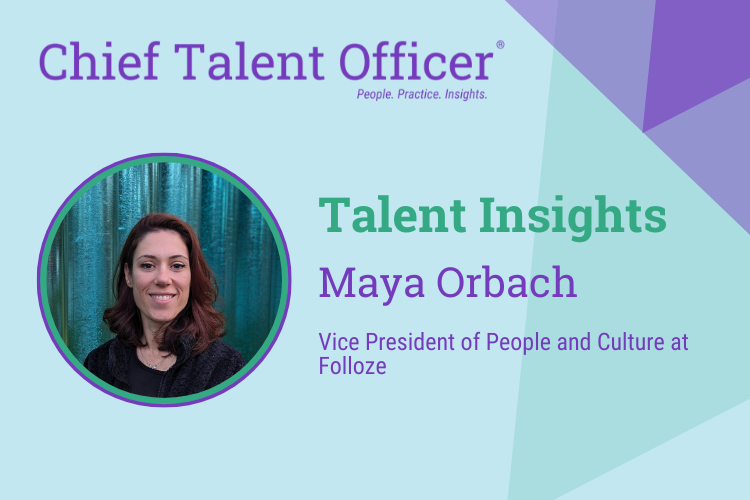Chief Talent Officer’s “Talent Insights” series is dedicated to sharing the insights and expertise of influential talent executives. In this Q&A series, we garner strategic insights, innovative approaches and challenges overcome from C-suite talent and HR executives, chief talent officers, chief people officers and more who are shaping the future of talent management.
What initially drew you to a career in talent management, and how have your experiences in the field evolved over the years?
My career path is somewhat unconventional. I began by designing environments that influence human behavior, focusing on the physical environment. I earned my degree in landscape architecture from the Technion-Israel Institute of Technology. I started working at the age of 18, collaborating with sociologists and psychologists on knowledge transfer and learning and development projects. Since then, I have served as a leader for talent and a culture curator, and have been involved in caring for people in various companies. My expertise lies in establishing foundations and processes that facilitate rapid growth and scaling.
What core values and principles do you believe are essential for building a positive and inclusive company culture?
My values are all borrowed from the natural world and are related to transparency, kindness, and flexibility. These values intersect to allow a free flow of communication for sharing ideas and feedback, which enables learning and growth. Kindness and flexibility allow feedback to be received in a way that can cultivate synergy and positive change.
Can you share a significant challenge you’ve faced as a talent leader and how you successfully navigated through it?
It can be challenging to help people prioritize their personal and professional development due to their busy schedules and routine work. However, we are working hard to curate relevant and practical content for our employees. For instance, we provide training for managers on topics related to their day-to-day work and leadership challenges. Additionally, we foster collaboration within our leadership community, allowing managers to leverage their shared experiences and knowledge to support each other’s growth.
“Our ability to influence depends on how respectful and insightful we are about the person we are coaching or mentoring.”
What strategies have you found most effective in attracting and retaining top talent in competitive industries?
* Investing in an employer brand is an important aspect of talent management. It is a process, not a point in time. We have been working on providing a delightful experience to our talent throughout the employee lifecycle. That means that we invest in our internal brand and we care about our talent’s insights and feedback. This is impactful when our employer brand is known and is recommended by /current past team members.
* Caring above all: We operate from the human perspective first and foremost. We are all humans that need to be seen, we all have lives, responsibilities, and commitments outside of work. When you show authentic empathy and care for people, they care for that culture and invest in it with empathy and care in return.
How do you balance advocating for employees’ needs while aligning with your company’s business objectives?
We embrace a strengths-based approach, believing that when individuals’ strengths align with their work, remarkable things happen. Our goal is to place people in roles where they can truly shine, leading to a significant impact on the company’s success. Additionally, we strive to take a comprehensive view of reality, considering various factors and predictors.
What leadership skills do you prioritize and cultivate as a senior talent leader to inspire your team and drive talent initiatives?
* Kindness: I always strive to show kindness, even in difficult situations. I ask myself at any given time: What’s the kindest thing I can do in this situation? Additionally, I use the skill of setting strategic clarity to reduce friction and increase impact. I believe that when people see the big picture, they make more impactful decisions.
* Honesty: In order to nurture and navigate relationships, both in the workplace and outside of it, I make it a point to prioritize honesty, and to be direct. This kind of approach reduces risks of interpretations that, in my experience, impact interactions and relationships negatively.
What game-changing advice would you offer if you could go back in time and mentor your younger self?
Patience! The talent function provides a unique wide perspective. By comprehending the business needs as well as the individuals’ strengths, career desires, etc. we sometimes can see several steps ahead, and predict with a high level of accuracy how things will unfold. However, people need to go through things at their own pace, choosing their path and we are unable to shorten the path for others. As leaders in the people function, our ability to influence depends on how respectful and insightful we are about the person we are coaching or mentoring.
What do you feel is currently the single biggest challenge facing talent professionals and the industry as a whole?
The larger economic and market situation is affecting the environment in which companies operate. This impacts the investment and planning around talent, growth, and employee wellbeing. The volatility and dynamic nature influence the growth and financial projections which in return creates a demand for continuous iterations and adjustments of talent strategy.
We’re always looking to showcase innovative tools and technologies. Can you share one tech product or platform that has significantly improved your work processes and why you find it valuable?
We recently launched a well-being program to acknowledge Mental Health Month. The platform we use offers a variety of self-care options, allowing everyone to choose what’s right for them. We prioritize personalization, but in this case, we wanted to give people the freedom to invest in their well-being without our interference.
Interested in being featured in our “Talent Insights” series? Please complete this FORM.
















